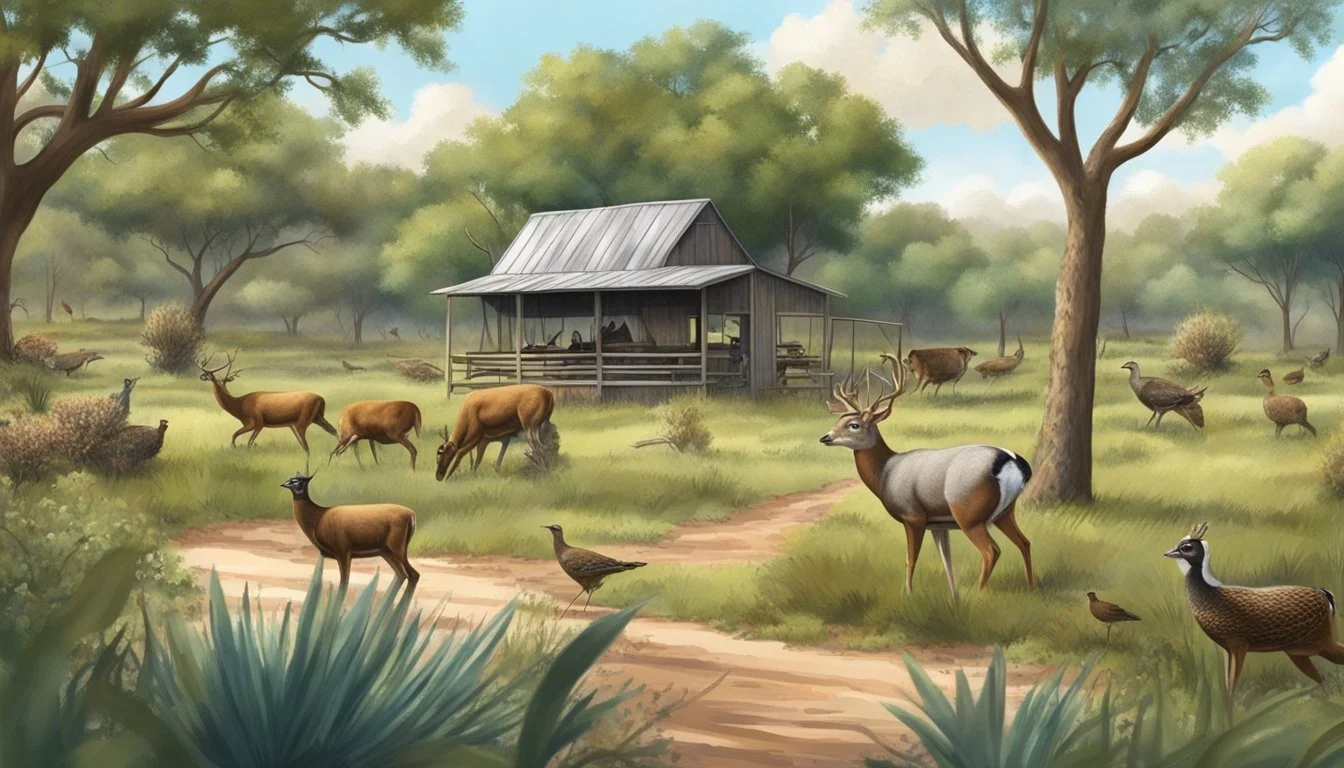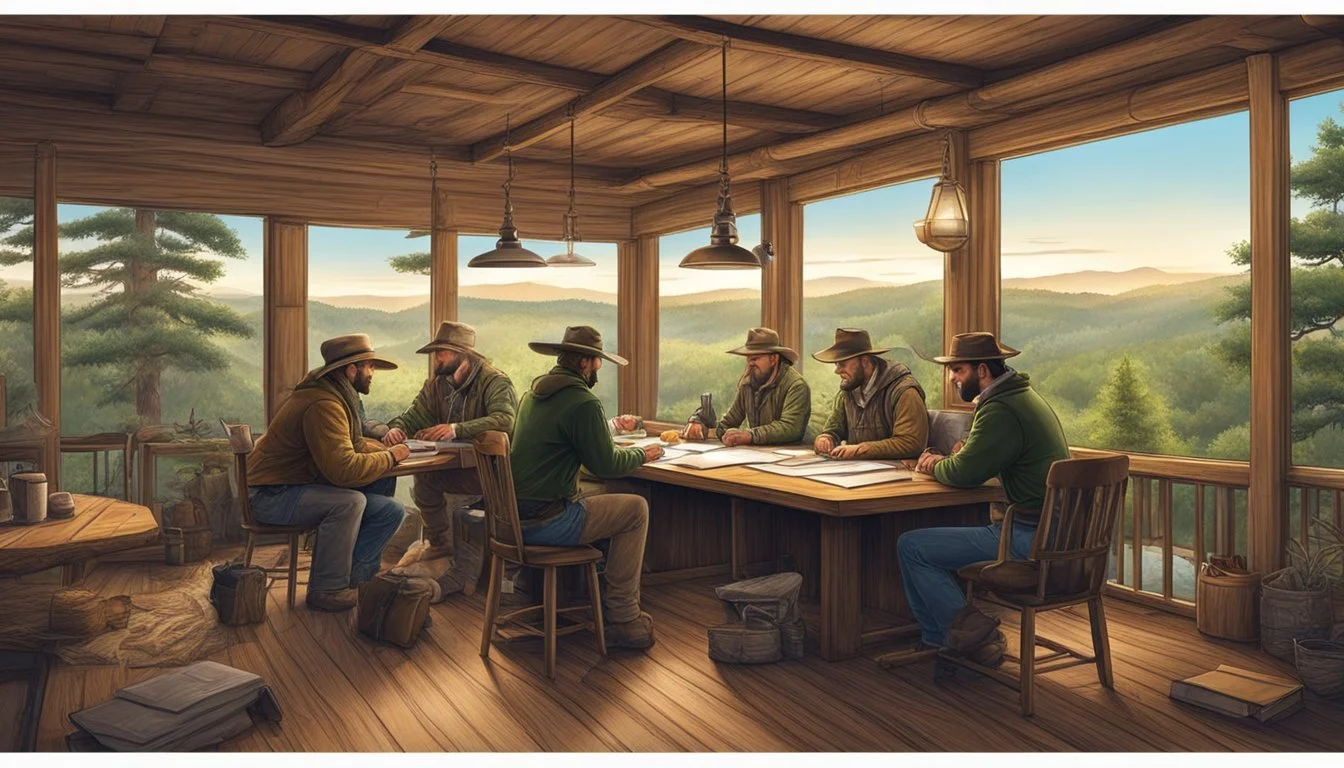Hunting Leases Texas
Securing Your Ideal Game Spot
In Texas, the vast and varied landscape offers an abundance of wildlife, making it a prime destination for hunters seeking quality game. Hunting leases in this region provide the opportunity to access private lands where public hunting is not available, often increasing the likelihood of a successful hunt due to better management and controlled hunting pressure. These leases can range from small acreages suitable for individual hunters to extensive territories ideal for larger hunting groups.
Property owners across Texas have recognized the mutual benefits of leasing their land for hunting. By offering their properties, they support wildlife management efforts and earn additional income, ensuring the conservation and upkeep of the land. Hunters in return get the chance to hunt species such as white-tailed deer, mule deer, hogs, turkey, pronghorn, and even exotics, depending on the region and habitat provided by the lease.
Choosing the right hunting lease in Texas requires consideration of various factors such as location, available species, lease terms, and pricing. Hunters frequently utilize online platforms and resources that connect them with property owners, offering detailed information about each lease, including maps, habitat types, and any additional amenities or restrictions. This allows for an informed decision-making process, elevating the hunting experience for enthusiasts who respect the land and pursue their passion for the sport.
Understanding Hunting Leases
Hunting leases in Texas provide a clear structure for hunters to access private land for hunting while offering landowners a source of revenue. It's important for both parties to recognize the various forms of leases, the benefits to property owners, and the commitments required by hunters.
Types of Leases
Texas hunting leases can take on several forms. There are seasonal leases for hunters aiming to pursue specific game like whitetail deer during the fall, and short-term day or weekend leases for those looking for a brief hunting trip. There are also year-round leases available, which allow for a variety of hunting activities throughout the different seasons.
Benefits for Landowners
Landowners benefit financially from leasing their properties for hunting. In Texas, where private land ownership is common, this presents a significant business opportunity. Income from leases can be a stable revenue stream that complements cycles in agriculture and petroleum sectors. Additionally, allowing hunting can help in managing wildlife populations, thereby preventing crop damage and reducing the risk of livestock diseases.
Responsibilities of Hunters
Hunters entering into a lease agreement accept certain responsibilities. They must adhere to the specific terms set forth by the landowner which can include the types of game allowed to be hunted, the number of hunters permitted on the property, and the adherence to safety and conservation practices. Compliance with both the lease's rules and Texas hunting regulations is essential.
Hunting Lease Regulations in Texas
The state of Texas maintains specific regulations surrounding hunting leases, which landowners and hunters alike must adhere to, including mandates for leasing licenses, compliance with deer season frameworks, and permissions necessary for legal hunting activities on private lands.
State Laws and Regulations
Under Texas law, landowners who lease their properties for the purpose of hunting must obtain a Hunting Lease License from the Texas Parks and Wildlife Department. This applies regardless of the type of compensation received for leasing the property. The license should be conspicuously displayed on the property leased for hunting. It's crucial to note the distinction between the Hunting Lease License for landowners and the standard hunting license that resident and non-resident hunters are required to possess.
Deer Season Framework
The deer season in Texas is established and regulated by the Texas Parks and Wildlife Department. It varies by county, with specific dates designated for different types of deer hunting, such as archery-only or general gun seasons. During deer season, all game laws and bag limits set forth by Texas Parks and Wildlife must be strictly followed. The timing of leases often correlates with these seasonal frameworks, and it is common for lease agreements to specify the duration of access in accordance with the legal hunting dates.
Hunting with Permission
In Texas, hunting on any private land requires express permission from the landowner. This ensures the hunter's activity is lawful and that the landowner is aware and consenting. Detailed documentation of this permission within the lease agreement protects both the landowner and the hunter and clarifies the terms, including the species of game allowed to be hunted, the methods permitted, and any rules specific to the leasing arrangement.
Wildlife and Game Management
In Texas, efficient wildlife and game management through hunting leases is crucial for sustaining healthy animal populations and ecosystems. This approach adheres to strict regulations, ensuring balance and conservation of habitats while providing hunting opportunities.
Species and Seasons
Species Season Dates Bag Limits Whitetail Oct 2 - Jan 16 5 deer, no more than 3 bucks Dove Sep 1 - Nov 12; Dec 18 - Jan 3 15 per day, 30 in possession Turkey Oct 2 - Jan 16 4 per season Quail (What wine goes well with quail?) Oct 30 - Feb 28 15 per day, 45 in possession Javelina Year-round in South Texas 2 per year Feral Hogs No closed season No limit Predators Various; open seasons for most No limit Exotics No closed season No limit
Bag limit refers to the maximum number of game species that can be taken by a person during a particular hunting season.
Population Management
Texas implements careful population management strategies to monitor and regulate the number of game animals, such as whitetail deer, dove, and feral hogs. Hunting leases play a pivotal role, allowing for controlled harvests to maintain healthy populations and mitigate overpopulation challenges. Texas Parks and Wildlife Department consistently evaluates and adjusts hunting regulations to prevent depletion of species while also addressing issues caused by overabundant animals, like crop damage and disease spread by feral hogs.
Habitat Conservation
Habitat conservation is integral to maintaining thriving ecosystems for turkey, quail, javelina, and other native wildlife. Texas dedicates significant efforts in working with landowners and hunters on private lands to ensure sustainable environments for game. Programs like the Landowner Incentive Program and the Farm Bill provisions support these practices, focusing on soil, water, and habitat enhancements. Safe havens for predators and exotics are also managed, ensuring these species contribute to the ecological balance rather than present challenges.
Leasing Process and Agreements
The leasing process in Texas involves meticulous planning and understanding of legal agreements, serving the interests of both landowners and hunters. It's crucial to start with thorough research and continue with drafting legally sound contracts to lay the foundation for a mutually beneficial relationship.
Searching for Leases
Landowners typically list their properties on various platforms where hunters can search for available leases. These listings offer details like location, size, habitat, and game available. Hunters should use updated listings and apply filtering options to find leases that meet their specific needs. Potential lessees can often sign up for email alerts to receive notifications about new listings that match their criteria.
Lease Terms and Conditions
A hunting lease agreement should clearly outline the lease term, specific conditions, and the obligations of both parties. It must include:
Lease duration: whether it's seasonal or year-round.
Payment terms: such as the amount, due dates, and method of payment.
Hunting rights: specifying what types of wildlife can be hunted.
Land use: detailing what areas can be accessed and any restricted activities.
Landowners and hunters should also agree on terms regarding the conservation of the land and wildlife management practices.
Renewals and Terminations
Lease agreements should address the process for renewal and outline the circumstances under which a lease might be terminated. Both parties should understand these terms to avoid future conflicts. Each party can negotiate these terms at the conclusion of the lease term and must provide notice according to the agreement if they do not wish to renew.
Hunting Lease Amenities and Infrastructure
In Texas, hunting leases often go beyond mere land use, coming equipped with various amenities and infrastructure to enhance the hunting experience. These leases may include accommodations, feeding systems, and essential water and fencing infrastructure to support both the game and the hunters.
Accommodations and Lodging
Many hunting leases in Texas provide lodging to accommodate overnight stays for hunters. These facilities can range from basic cabins to more luxurious lodges, often including utilities such as electricity and running water. Hunters can expect the comfort of a home away from home as they plan their hunting excursions.
Type of Accommodation Features Basic Cabins Essential amenities including beds and kitchenette Upgraded Lodges Enhanced comforts such as full kitchens, bathrooms, and lounging areas
Feeding and Blinds
A crucial aspect of managing a successful hunting lease is the provision of feeders and blinds. Protein feeders and standard corn feeders are commonly used to attract and nourish game throughout the year.
Feeders: Regular supply of nutrition to game; include timed release to regulate feeding
Blinds: Constructed for optimal concealment; includes rifle blinds for strategic positioning
Lease operators maintain these structures to ensure safety, effectiveness, and a sustainable hunting environment.
Water and Fencing
Reliable water sources and fencing are key to the management and operation of hunting leases.
Water: Critical for wildlife sustenance, can include natural or man-made sources.
Fencing: High fences over eight or ten feet tall are utilized to manage game within the property. These fences serve to maintain the welfare of the game and often mark the boundary of the hunting area.
Infrastructure Purpose Description Water Troughs Sustenance Provide consistent water supply to game High Fences Property Management Enclose the hunting area and help in managing game movements
Financial Considerations
When entering into a hunting lease agreement in Texas, both landowners and hunters face financial implications that are crucial to the understanding of each party’s responsibilities and potential gains. Careful consideration of lease prices, income potential, and membership fees will ensure a fair and profitable transaction.
Determining Lease Prices
Landowners and hunters must negotiate prices that reflect the value of the property and the quality of the hunting experience. Lease prices are typically influenced by factors such as geographic location, game availability, and the amenities provided. A well-documented lease agreement should specify the cost, often calculated per acre or on the basis of the quality and type of hunting opportunities available.
Per Acre Price: Ranges based on location and availability of game
Quality-Based Price: Adjusted according to the hunting experience offered
Income Potential for Landowners
Leasing property for hunting can be a significant source of income for landowners in Texas. This income can help offset property taxes and other land ownership costs. The actual revenue generated will vary widely depending on the property size, the types of hunts offered (such as trophy or meat hunts), and the duration of the lease agreements.
Short-term Leases: Allow for multiple leases in a year, often at a higher price.
Long-term Leases: Provide steady income over a longer period but may require discount incentives.
Membership Fees
For hunting clubs or groups, membership fees can be employed as a method of managing access and distributing the lease cost among members. These fees often reflect the exclusivity of the lease and the management of the property for hunting purposes.
Individual Membership: Offers a personal lease within a managed group setting
Group Membership: Allows multiple users, often at a discounted rate per member
Hunting Culture and Social Aspects
In Texas, hunting leases are not only a means to manage and control wildlife populations but also a medium through which hunters forge a sense of community, uphold ethical hunting practices, and experience the outdoors as families or groups.
Ethical Hunting Practices
Texas hunters place great value on the ethical treatment of wildlife. Ethical hunting practices ensure sustainable wildlife management and respect for the land and its inhabitants. Hunters often adhere to the principles of fair chase, and many become members of organizations that promote conservation and responsible hunting. The emphasis is on taking only what one needs and using all parts of the animal to minimize waste.
Community and Membership
Hunting leases in Texas foster a sense of community among hunters. Leases often require membership subscription, connecting individuals who share a passion for the outdoors. These memberships cultivate camaraderie and facilitate mentorship between experienced hunters and novices. Within this community, members often collaborate on wildlife management strategies and habitat conservation efforts, contributing to the ecosystem's health.
Family and Group Hunting
Group hunting is a tradition that allows family and friends to bond through a shared outdoor experience. It's common for a family to have a hunting lease where they can teach younger generations ethical hunting, marksmanship, and survival skills. Group hunts also allow friends to share the cost of leases and create memorable experiences, often around campfires in their campsites, recounting the day's achievements.
Additional Hunting Opportunities
Texas offers a wide array of hunting opportunities beyond the traditional season leases, catering to various types of hunters and preferences. Whether an individual is seeking a species-specific adventure or a more defined hunt experience like trophy or management hunts, Texas provides options that suit a range of hunting goals.
Species-Specific Hunts
Texas hunting leases often provide species-specific opportunities that cater to hunters looking for a particular type of game. For instance, spring turkey hunts are popular among enthusiasts aiming to target the gobblers during their mating season. Additionally, dove hunting is a favored activity, with leases offering access to fields that attract these fast-flying birds, creating challenging yet enjoyable hunts. Here's a look at some of the specific hunts available:
Spring Turkey: Targeting gobblers in their mating season.
Dove: Opportunistic hunts during the birds' migratory passage.
Day and Package Hunts
Many hunters may not be looking for long-term commitments and instead opt for day hunts or package hunts. Day hunts are perfect for those seeking a quick hunting trip without the need for a seasonal lease. Packages can provide a combination of lodging and hunting that extend over several days, which may include meals and guides. This flexibility allows for:
Single-day excursions focused on quick trips for specific game.
Weekend hunting getaways that include various amenities.
Trophy and Management Hunts
For the more management minded hunters, Texas leases can present management hunts aimed at maintaining a balanced ecosystem by harvesting specific types of game. These hunts are particularly essential for controlling populations and promoting overall health within species. In pursuit of trophy bucks or trophy whitetail deer, hunters can select leases that specialize in opportunities to land a significant and mature specimen, recognizing the importance of:
Trophy Hunts: Tracking and harvesting premier trophy animals.
Management Hunts: Targeting animals as part of a broader conservation strategy.
By utilizing the diverse offerings of Texas hunting leases, enthusiasts can find hunting experiences tailored to their particular interests, from the pursuit of specific species to the thrill of a trophy conquest.
Support Services and Resources
Navigating the landscape of hunting leases in Texas requires reliable support services and resources. Hunters have access to a variety of suppliers and experts that assist in enhancing the hunting experience through essential equipment, knowledge on wildlife management, and specialized lease services.
Hunting Equipment Suppliers
Hunters in Texas have a diverse array of hunting equipment suppliers at their disposal. These suppliers offer a comprehensive selection of gear, ranging from firearms and ammo to camouflage apparel. Renowned for their expertise, suppliers also provide invaluable advice on the best equipment suited to the Texan terrain and game.
Key offerings include:
Firearms and archery gear
Hunting apparel and footwear
Game processing kits and accessories
Wildlife Biologists and Outfitters
Wildlife biologists and outfitters play a crucial role in sustainable hunting practices. Biologists offer insights into wildlife behavior and habitat management, ensuring hunters are educated on conservation. Outfitters, on the other hand, provide guided hunting experiences, complete with expert advice on local game patterns and safe hunting strategies.
Services they offer:
Wildlife population management advice
Guided hunts and expert tracking services
Hunting Lease Services
Hunting lease services specialize in connecting hunters with prime hunting leases throughout Texas. They vet properties for quality and safety, offering a variety of leases that cater to different hunting preferences. Additionally, these services often mediate between landowners and hunters, ensuring legal and ethical standards are upheld.
Benefits provided by lease services:
A curated selection of private and public lands
Lease agreement facilitation and liability management
Seasonal and annual lease options
Texas Hunting Lease Listings
In Texas, hunters have the opportunity to secure prime hunting grounds through a system of leases. The listings are regularly updated with various options that cater to specific hunting preferences and needs.
Finding Updated Lease Openings
Hunters looking for the latest available properties can find updated lease openings through dedicated hunting lease websites. These websites provide a dynamic listing that is frequently refreshed to display new opportunities. Interested individuals can join now by signing up for mailing lists to receive instant notifications via email as new leases become available.
Updated Listings Sites:
HuntingLocator.com
HLRBO
Texas Hunting Post
Exclusive Listings and Opportunities
For those seeking more selective hunting experiences, exclusive listings offer access to private lands with a range of specific game types. These opportunities are often not broadly advertised and require prospective lessees to contact the lease owners directly. It is advisable for one to act quickly when these exclusive openings are announced to secure their preferred hunting grounds.
Contact for Exclusive Listings:
Email: [contact information for exclusive listings]
Direct Inquiry: Recommended for immediate response
Note: Always verify the credibility of the listings and ensure they comply with local wildlife management regulations.
Notable Texas Hunting Lease Properties
Texas boasts an impressive array of hunting leases that cater to a variety of hunting preferences and experiences. This section focuses on the prominence of large-scale ranches and the availability of unique hunting experiences within the Lone Star State.
Large-Scale Ranches
In the realm of expansive territories, the 21,000-acre ranch located near Sterling City stands out. Sterling City, nestled within Irion County, presents hunters with vast landscapes teeming with wildlife. On such a property, one might find extensive lodge facilities offering comfort and convenience for groups of hunters.
Another extensive property is found in the Hill Country, where deer populations flourish. The area is known for its white-tail and axis deer, offering challenging hunts for enthusiasts. These large-scale ranches not only provide ample space for hunting but are often managed for conservation and game management, enhancing the hunting experience.
Unique Hunting Experiences
For those seeking a hunt that's out of the ordinary, Texas does not disappoint. Properties boasting Nueces river frontage offer scenic views and diverse ecosystems. The Charlotte Wilson Acres, for instance, could provide a picturesque backdrop to any hunt. The presence of water bodies contributes to robust wildlife habitats, perfect for hunters in search of a serene yet fruitful venture.
Unique wildlife such as Japanese sika, Dybowski sika, and aoudad can be found on select properties, providing a unique challenge for hunters. Moreover, the Sonora region is noted for these exotic species, alongside the more common fallow deer, adding to the allure of these exceptional hunting locales. These properties offer hunters the opportunity to pursue game that's not typically found on standard leases, adding an exotic twist to the traditional Texas hunting excursion.
Conclusion
In Texas, hunting leases play a significant role in the state's outdoor recreational offerings, contributing to both the economy and the management of wildlife populations. Leases range significantly in size, with an average of 2,463 acres, and cater to the preferences of diverse groups of hunters seeking different experiences.
Hunting Seasons:
General Season in the North Zone typically spans from early November to early January.
The South Zone's General Season also begins in early November but extends to late January.
Special Late Seasons are available in both zones, providing additional opportunities.
Benefits for Landowners and Hunters:
Landowners often find hunting leases to be a reliable source of income.
Hunters benefit from access to private lands known for well-managed wildlife resources.
Regulations:
Texas enforces specific hunting laws to ensure safety and conservation.
Hunters are expected to comply with these laws throughout the hunting seasons.
It is clear that hunting leases are a cornerstone of Texas's hunting culture, offering structured and regulated hunting environments. This structure supports conservation efforts while also serving the state's economic interests. Texas stands out due to its limited public lands, making private leases a valuable commodity for hunters aiming for quality deer hunts and potentially other game.
For anyone interested in Texas hunting leases, thorough planning and adherence to state regulations are essential for a responsible and enjoyable hunting season.








